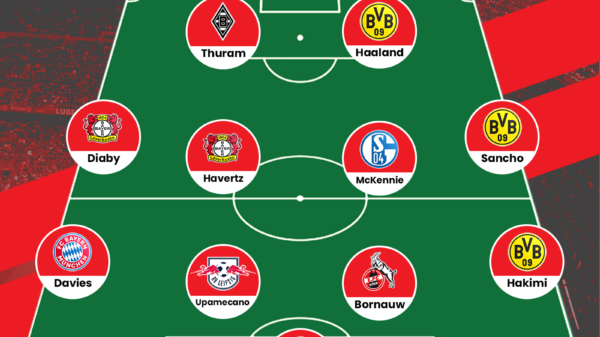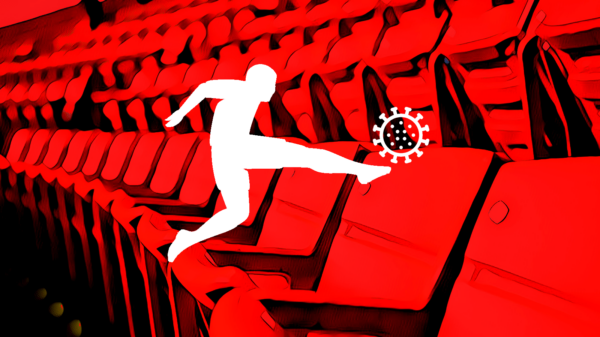
In-match silence protests, dictator references, funeral services for German football supporters’ traditions, team hotel obstructions and a severed bull’s head, but is the extreme hate for RB Leipzig excessive and somewhat hypocritical? Richard Pike argues their case.

It is fair to say that the last 10 years have highlighted the excellent state of health of German football. In club football, Bayern Munich have rediscovered themselves as a major European force with a Champions League win in 2013 and consistent appearances in the Champions League Semi Finals. Borussia Dortmund, firstly under now-Liverpool manager Jurgen Klopp and now under their new technician supreme Thomas Tuchel have re-emerged as both a domestic and European force. Things have been arguably even better for the national team, since the 2006 FIFA World Cup, Germany’s performances at both the European Championships and World Cups read the following: Euro 2008 – Runners-Up, 2010 World Cup – 3rd place, Euro 2012 – Semi Finalists, 2014 World Cup – Champions, Euro 2016 – Semi Finalists. Prior to hosting the 2006 World Cup, Germany’s national team was ageing and little youth talent had emerged through academies. After the heroic run to the semi-finals of that tournament, in what has now been termed “Das Reboot”, the German national youth teams are now consistently amongst the best in the world and every year, new talented youngsters make their Bundesliga club debuts highlighting the strength of clubs’ academies compared to over a decade ago.
All of this, combined with a large new television deal valued at EUR 4.64 billion over 4 years starting from the 2017-18 season which combined with the fall of the pound post-Brexit could soon stop the exodus of Bundesliga talent flooding to the Premier League and Germany’s famous 50+1 club ownership rule which ensures the members/fans can retain a crucial say in the ownership and running of their clubs . What is there to dislike?
Well, let’s just say there is one big elephant in the room and fans are expressing a pure hatred towards it. That elephant is the Bundesliga’s newest club, RB Leipzig. After their formation in the summer of 2009, which also makes them the youngest club in Germany’s top three professional divisions after they bought the operating license of 5th division club SSV Markranstaedt located 13 kilometres from the city of Leipzig, they have rose up through the German league system and on 8th May 2016, just seven seasons into their existence, RB Leipzig secured promotion to the 1 Bundesliga after a 2-0 win at home against Karlsruhe.
On first glance, it may seem difficult to see the contempt reserved for this club, small new club rises through the leagues and is the Bundesliga’s first representative from the old East Germany since Energie Cottbus in the 2008-09 season. However, dig a little deeper and one can certainly see just why this club is causing such unrest and concern amongst German football fans. The first clue is in the name, the “RB” in the club’s name officially stands for RasenBall (Lawn Ball), however, the RB is widely seen by many as a reference to RB Leipzig’s owners, Austrian energy drinks giant Red Bull GmbH who have to use RasenBallsports Leipzig as an alternative to calling the club Red Bull Leipzig as German clubs are prohibited from using their sponsor’s name in their title. Throughout RB Leipzig’s existence, Red Bull has lavishly backed its new project in East Germany which has allowed them to climb up the divisions into the top level of German football in much the same way that the late Jack Walker’s investment in Blackburn Rovers between 1991 and 1995 turned them from second division provincial club to Premier League champions in four seasons. Because of the 50+1 rule, Jack Walker/Roman Abramovich’s are a rarity in German football, and one could argue the closest thing to RB Leipzig is their fellow Bundesliga club 1899 Hoffenheim who rose up the leagues thanks to the backing of Dietmar Hopp, the founder of German software giant SAP SE.
However, the intense hate towards RB Leipzig comes from the fact that their presence in the German top flight is a very threat to the 50+1 rule that German football fans hold in such high regard. As the following article from the Guardian newspaper shows, to become a club member which allows fans to have a say in the running of a club in Germany, there is an annual subscription, Dortmund’s annual subscription costs the small figure of EUR 62 per year for adults, whereas RB Leipzig’s costs far higher, a fee of EUR 1,000 per year. This has resulted in Dortmund having far higher membership numbers than RB Leipzig, 139,000 in comparison to 17. Most notably though, the article states that the majority of RB Leipzig’s 17 members are either employees or associates of Red Bull, which has led to heavy criticism in Germany amongst fans that they are damaging the spirit of the 50+1 rule by doing their best to get around it using loopholes.
In every league there are love them or hate them with no-inbetween clubs, Juventus in Italy is probably the most notable example, furthermore, I have seen serious vitriol aimed at opposing individual players from fans on the terraces (the most notable example was Luis Figo’s returns to Barcelona’s Nou Camp as a Real Madrid Galatico). However, the sustained hate campaign over the last seven seasons aimed at RB Leipzig is unlike anything I have seen in football before. Some of the vitriol has included vandalising the pitch of their old ground in Markranstaedt with weedkiller, a “Nein zu RB” (No to RB) campaign by fan groups across Germany, Union Berlin supporters dressing in black and remaining silent for 15 minutes in the recreation of a funeral scene before their second division match against RB Leipzig in the 2014-15 season, Karlsruhe fans breaking into the hotel of RB Leipzig’s players to obstruct them before a second division match, Erzgebirge Aue fans displaying a banner which compared Red Bull’s Austrian founder Dietrich Mateschitz to Adolf Hitler and finally, the fans of fellow East German club Dynamo Dresden hurling a severed bull’s head down from the terraces during RB Leipzig’s First Round German Cup game away in Dresden earlier this season.

Fans of Karlsruher SC with masks protest against RB Leipzig. Photo by Matthias Hangst / Bongarts / Getty Images
It seems that they are in fact no one’s cup of tea, however, is this hate for RB Leipzig excessive and hypocritical? I believe so. Before I explain why, I want to make it clear that I am not their biggest fan and the aforementioned methods of trying to get around the 50+1 rule are a threat to the future of the rule, however, I am going to defend them and criticism of their model to an extent.
My first defence of RB Leipzig is a response to a quote about the club I found in a Bundesliga article written in the Guardian newspaper in August. It comes from Mr Jan-Henrik Gruszecki, a fan of Borussia Dortmund who co-organised a protest against RB Leipzig prior to Dortmund’s away match against the club earlier on this season, which RB Leipzig won 1-0. The protest involved a boycott of the away section of the ground with all the participants of the protest refusing to attend the fixture. Mr Gruszecki was quoted as saying “Of course Dortmund makes money, but we do it in order to play football, but Leipzig plays football in order to sell a product and a lifestyle.” “That is the difference.” I can understand Mr Gruszecki’s opinion about RB Leipzig, but personally, I find it hypocritical when one could argue the very same thing about another fellow Bundesliga club much older than RB Leipzig, the 2008-09 Bundesliga Champions VfL Wolfsburg. Whilst it is true that Wolfsburg were formed as a works football club for the employees of Volkswagen AG who moved to the newly built city of Wolfsburg just prior to the start of World War Two, one look at the modern history of Wolfsburg shows little difference between them and RB Leipzig. The owner of Wolfsburg is Volkswagen, in the same way RB Leipzig is owned by Red Bull, Wolfsburg’s stadium is called the Volkswagen Arena, no different to RB Leipzig’s Red Bull Arena, finally, Wolfsburg’s main shirt sponsor is Volkswagen, RB Leipzig’s? You don’t need a prize for guessing. If Mr Gruszecki is refusing to attend RB Leipzig’s stadium because he sees them as “selling a product and a lifestyle”, then I hope he has not attended any matches at Volkswagen Arena over the years as surely Wolfsburg are just “selling a product and a lifestyle” as well? After all, if they were not “selling a product and a lifestyle” why do they have the logo of Volkswagen plastered all over the front of their players’ shirts and all over their stadium?
My next line of defence surrounds the Bundesliga’s rules which prohibit clubs from using their sponsor’s name in their title. Across the vast majority of German football, this rule is in force, however, there are a few exceptions, the most notable one being a club that everyone is familiar with, perennial Bundesliga heavyweights Bayer 04 Leverkusen who are owned by German pharmaceutical giant Bayer AG. The official explanation as to why Bayer Leverkusen are granted this exception is because the club has existed for over 100 years and the club was developed from a former company-facilitated football club specifically formed for the company’s employees. I find this rule more hypocritical than the aforementioned protest against “selling a product and a lifestyle”. If you are going to prohibit RB Leipzig from including the name “Red Bull” in their title, then you should force Bayer Leverkusen to drop the “Bayer” from their title and rename themselves Leverkusen SV (SV stands for Sport Verein “Sport for all”) or something similar. Irrespective whether Leverkusen are 100 years older than RB Leipzig or not, you either apply the rules unilaterally across the board or you don’t have a rule at all. It would be like saying to Chelsea and Manchester City just before the purchases of their clubs by Roman Abramovich and Sheikh Mansour in 2003 and 2008 respectively that they cannot have a big money takeover of their clubs but it was ok for Blackburn to have a large injection of cash from Jack Walker to propel them to a level far beyond their natural limit because Blackburn were one of the founding members of the English football league in 1888 whilst Chelsea and Man City were not.
Another complaint levelled at RB Leipzig is a common complaint levelled against the likes of Chelsea and Manchester City that their success is artificial and they have simply “purchased” it, just like RB Leipzig have “purchased” their way into the top flight. Yet, the Bundesliga has already had an example of a club that has been elevated to a high level via the large financial backing of their owner, step forward 1899 Hoffenheim who were promoted to the Bundesliga for the first time for the 2008-09 season where they have remained ever since. Hoffenheim may play in a modern 30,000 capacity stadium in the town of Sinsheim in the state of Baden-Wuerttemberg, yet they are from the small village of Hoffenheim, with a population of just over 3,000 which is part of Sinsheim municipality. In 2000, Hoffenheim was a fifth tier side in Germany, who managed to win four promotions in 8 years to reach the top flight, due to large investment into the club from businessman Dietmar Hopp, a co-founder of German software giant SAP SE. Whilst there is a Jack Walker and Blackburn romanticism over Hopp’s investment into Hoffenheim because he previously played for their youth team, Hoffenheim are naturally inflated above their level due to a wealthy owner who has ploughed millions into the club, commonly called “financial doping”. Hoffenheim’s level if you were to take away Hopp’s investment would be somewhere between the 3rd and 5th tier of German football, a club based in a village of just over 3,000 people is bound to have a limit that it can reach without the financial capital that Mr Hopp has provided.
Critics who are against this kind of “financial doping” in football state that it betrays the principle of football clubs being able to progress naturally and destroys a football club’s spirit. However, one could argue that Leverkusen and Wolfsburg are two further examples of the above criticisms. Both surely enjoyed a considerable financial advantage over competing clubs when both were in the regional German divisions below the Bundesliga owning to the wealth of their backers Bayer and Volkswagen in the early formative years after the establishment of German professional football in 1963. Not to mention that the “spirit” of both clubs’ respective formation as works clubs for their employees evaporated years ago given that now all the current club employees are professional football players as opposed to factory workers at Bayer and Volkswagen. Unless of course Leverkusen’s current star, Mexican striker Javier Hernandez unbeknown to everyone is secretly an employee of Bayer’s Mexican subsidiary company on a temporary work placing in Germany, working Monday to Friday at Bayer and then playing Bundesliga football on weekends?
I even have a defence for RB Leipzig when it comes to the aforementioned accusations that they are destroying the aforementioned 50+1 rule. This rule is evidently one that German football clubs hold in high regard, as emphasised in 2009, when then Bundesliga club Hannover 96 called a meeting of the 36 clubs that then made up the top 2 divisions of German football to vote on abolishing the rule stating that it hinders them from attracting external private investment outside of sponsorship. In the vote, 33 out of 36 clubs rejected the proposal with just 2 abstentions and one vote in favour of abolishment, unsurprisingly from Hannover. However, this was made part of the way through the 2009-10 season, when the previous five seasons prior to the vote had seen 3 different Bundesliga winners, Bayern Munich in 2004-05, 05-06 and 07-08, Vfb Stuttgart in 06-07 and Wolfsburg in 08-09. Three different winners in five years is the sign of a moderately competitive league, hence no grumbles or complaints from clubs or fans to abolish the 50+1 rule. However, lets hypothetically say that Bayern wins the league again this season and then part of the way through next season, Hannover, or another smaller club calls another vote on whether or not to abolish the rule, it would be very interesting to see what the results would be this time. Why?, because assuming Bayern win this season’s championship, it would be their fifth consecutive championship, meaning that at the time of another hypothetical vote on maintaining the rule, the Bundesliga will have gone from having 3 different champions in 5 seasons to just 1 champion in 5 seasons. In the event of such a possibility, I do think the 50+1 rule would be maintained once more, however, I have no doubt that the number of clubs voting against it or even abstaining would be a lot higher than the 1 and 2 respectively in 2009.
Bayern’s recent dominance and vast financial advantage over all their other Bundesliga rivals could raise serious concerns about the future attractiveness of a product that the Bundesliga is able to provide. There could come a time when the carrot of being able to have a say in the running of your club and cheap ticket prices which the 50+1 rule preserves eventually cannot be dangled any longer. To illustrate this point, let’s use current Bundesliga club Eintracht Frankfurt, in the last 20 seasons, Frankfurt have spent 14 of these seasons in the top division and the remaining 6 seasons in the second tier of German football. In their 14 top flight seasons, Frankfurt achieved a highest finish of 6th place in 2012-13, for the majority of the seasons over this period, the club has constantly finished in the lower half of the Bundesliga table (Between 10th and 18th) and always within either a season or two of relegation to the second tier, they have won promotion back to the top flight once again. Eventually, even the most die-hard Frankfurt fan could feel disillusioned with the current situation, often too good to be relegated to the second tier of German football, but not good enough to kick on from mid-table and end one season in the top 4 of the Bundesliga, to get into the Champions League. As a football fan, you eventually want to have an element of a feel good factor to start a new campaign with, even if it was just for one season. The 50+1 rule prevents a wealthy businessman either from Germany or overseas from buying into Frankfurt, providing them with additional finances to make a push for the Champions League, or even potentially dethroning Bayern. With the 50+1 rule and no external private investment, these aforementioned dreams are likely to be no more than just that. Finally, without wanting to make it look like I have a moral crusade against Leverkusen and Wolfsburg, both are exempt from the 50+1 rule due to their past as works clubs. Once again, granting exemptions here to clubs is wrong irrespective of their past status, either the rule is applied to everyone or no-one.
I would imagine that a lot of Bundesliga fans who do not support Leverkusen, Wolfsburg or Hoffenheim don’t simply say nothing bad about these three clubs and do not particularly like them. Leverkusen owing to their links to Bayer have been assigned the derogatory nickname of “Pillendreher”(Tablet Twisters) by opposing fans, Hoffenheim’s opening Bundesliga game this season saw a banner unveiled by their fans to RB Leipzig proclaiming “We want our throne back: Germany’s most hated club”. Even matches between Leverkusen and Wolfsburg in the Bundesliga have been classified under the derogatory nickname of “El Plastico” by certain sections of the media. However, all have received a tiny fraction of the animosity that RB Leipzig have received over the last few years and I can never remember protests or even displays of violence being demonstrated against Leverkusen, Wolfsburg or Hoffenheim like the aforementioned acts against RB Leipzig.
If you were to peel away the formation, ownership and history of RB Leipzig for just one moment to assess the club, there are some positive things. Firstly, the club continued their policy of solely buying young players in the transfer market for their squad in this summer’s transfer window. The club purchased five players, which included young 19 year-old Scot Oliver Burke from Nottingham Forest. Their other purchases, Timo Werner from Stuttgart, Marius Muller from Kaiserslautern and both Benno Schmitz and Naby Keita from Red Bull Salzburg are 20, 23, 21 and 21 years old respectively. When a smaller club wins promotion to their country’s top division for the first time, they often understandably opt to recruit experienced players in an attempt to stay up and then stabilise themselves in the division. So RB Leipzig should be praised for not going down that route and for sticking to their policy. Secondly, it is one thing buying young players, it is another thing actually making sure they do get first team football. For RB Leipzig’s 3-1 win at home against Werder Bremen on the 8th Matchday of the season which lifted the club up to 2nd in the standings with only Bayern above them, only 3 members of their starting line-up were aged over 25 years and it had an average age of just 24.18 years.

Timo Werner, one of many youngsters captured by Leipzig in the transfer market | Photo by Alexander Hassenstein / Bongarts / Getty Images
Their strategy is in complete contrast to a club like Chelsea who invest tens of millions into dozens of talented young players aged between 16 and 21 and then barely give any of them a run of games in their first team. Finally, RB Leipzig intend to do what many other Bundesliga clubs have done recently by investing in and then bringing through local youngsters from their own academy into their first team. Red Bull’s owner Ditreich Mateschitz has even set a target of RB Leipzig eventually composing a majority of their starting eleven from youngsters brought up in their youth academy. RB Leipzig has recently poached under 16 youngsters from the youth teams of clubs such as Hertha Berlin and Hannover to fill up their youth teams which can understandably bring criticism. However, sadly, the transfer of minors between clubs is commonplace across world football in the modern era and is extremely difficult to police. Fans like those of clubs like Bayern Munich can hardly complain either, when Bayern chairman Karl-Heinz Rumenigge criticised English Premier League club Arsenal of poaching the likes of Cesc Fabregas as a minor, Arsenal manager Arsene Wenger highlighted that Bayern and Rumenigge themselves have been guilty of the same tactics when they brought Paraguayan striker Roque Santa Cruz to their club at the age of just 17.
The last of these three above examples could be an attempt to reverse an East-to-West player brain-drain that has existed since German reunification in 1990. The best example of this was former German international striker Alexander Zickler who was born in the old East Germany in 1974 and broke into Dynamo Dresden’s first team as an 18 year old in the 1992-93 season. At this time straight after reunification, former East German clubs like Dynamo Dresden were instantly at a disadvantage compared to their West German counterparts. In both the 1991-92 and 1992-93 seasons, Dresden narrowly avoided relegation from the top division in Germany, yet financially were finding it difficult to compete alongside West German clubs. In the summer of 1993 to raise cash, Dresden sold the then 19 year old Zickler to Bayern Munich for a fee just short of EUR 1.2 million in today’s market to raise funds. Whilst Zickler had transferred to Bayern, it was not instantly to their first team, as he spend his first season in Bayern’s reserve team to further develop before breaking into their first team in his second year at the club. The fact that Zickler could not continue his development at Dresden and had to leave for a West German club is indicative of the brain-drain referenced above. RB Leipzig, armed with Red Bull’s investment could now initiate a turning point. Leipzig is an East German city that has received a lot of investment post-reunification to make it a liveable place for residents. With strong financial backing and a commitment to promoting young talent, RB Leipzig may not suffer the same fate as Dynamo Dresden nearly 25 years ago where a young player in their academy has to migrate to a Western German giant to develop his talents like Zickler did.
Regrettably, should any fellow East German club wish to first reach the German top flight and then establish themselves as a credible force, following the example of RB Leipzig may well be the only option. Dynamo Dresden are probably one of the few other East German clubs who could achieve the above first step of winning promotion to the Bundesliga, but they would likely struggle to do more than battle against relegation every season. Because the 50+1 rule prevents private external investors from investing into a club in Germany, the revenue that a club can attain from sponsorship by companies is crucial to its chances of finishing as high up a table as possible. Instantly, this aforementioned point highlights why Dresden or any other East German football club could find things tough in the top flight in future years. I recently looked into the largest companies in Germany by their revenue, whilst I could not find the most recent information, the following article outlines the largest 32 German companies by revenue in 2012, not one of the 32 companies listed in this article is headquartered in an East German city. Even if you took the most recent statistics for 2015 or 2016, I still doubt the top 32 German companies would contain an East German headquartered company. If you stretched it out to the top 100 German companies, you might find some, but I highly doubt it would be more than 2 or 3 out of 100. As this article that I found on the recent struggles of East German football clubs since German reunification highlights, East Germany, a quarter of a century on from reunification still lacks big businesses and companies compared to West Germany and has nearly double the unemployment rate in some parts. The West/East divide in Germany is almost a carbon copy of the divide between the rich and industrial North and the poor and agricultural South in Italy. Like RB Leipzig and Dynamo Dresden in East Germany, the South of Italy only has two medium-large sized football clubs who have a chance of either holding their own in mid-table against their Northern counterparts in Serie A (US Citta di Palermo) or challenging for the Serie A title (SSC Napoli) and both these two clubs are located in the two largest Southern Italian cities, Palermo and Naples. Football is a costly industry nowadays and as all of the above illustrates, if you unfortunately do not have a lot of money, 99 times out of 100 you will struggle to get anywhere fast.
So to conclude, I can understand a dislike or a lack of willingness to put RB Leipzig on a plinth as one of Germany’s most favoured football clubs by German football fans, however, I think the intense hate is a little hypocritical and excessive as illustrated with the Leverkusen, Wolfsburg and Hoffenheim examples. You cannot even accuse them of doing the exactly the same thing that MK Dons and the English FA did to the old Wimbledon FC as RB Leipzig only bought the competing license of SSV Markranstaedt, located only 13 kilometers away from Leipzig as opposed to Milton Keynes which is located nearly 65 miles (105 kilometres) from Wimbledon. SSV Markranstaedt were still able to function as a club from 2010-11 in the sixth tier of German football and reportedly received a fee for their license of EUR 350,000. A club representative, Mr Holger Nussbaum has stated that this fee enabled them to invest in players previously beyond the reaches of the club and they have since won promotion to the German 5th tier, only one promotion away from reaching a set target of the fourth tier. Furthermore, SSV Markranstaedt can still play matches at their original home ground. Finally, Bayern Munich now might have a little more regular competition on their hands alongside Dortmund with the emergence of RB Leipzig, which can only be a good thing for the Bundesliga long-term as one club’s domination of a championship can damage it. If Manchester City and Chelsea had not had their big money takeovers and challenged Manchester United’s dominance of English football throughout the 1990’s and early 2000’s, you can bet the television rights deal for all the Premier League clubs would be considerably lower than it is now. There is an element of sadness that this is the only method a smaller club often must follow to break up the hegemonic dominance of the top clubs in modern football, but that is the monster that the formation of the Premier League and Champions League in 1992 has created.
Read more special articles here.
- What could be the consequences of another lockout of the Champions League knockouts by Europe’s “Big Five” leagues? - November 24, 2020
- 2020-21 Serie A: U20 Young Players To Watch - September 16, 2020
- 2020-21 La Liga: U20 Young Players to Watch - September 12, 2020


























































